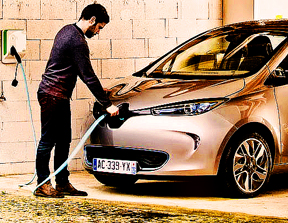All New German Cars Must Be Emission-Free by 2030
 In little more than a decade, German motorists will have to manage both those highways and local roads driving zero-emission vehicles, according to a senior government official. All new vehicles registered after that date will need run on batteries or hydrogen.
In little more than a decade, German motorists will have to manage both those highways and local roads driving zero-emission vehicles, according to a senior government official. All new vehicles registered after that date will need run on batteries or hydrogen.
While a number of countries, including the U.S., are taking steps to increase the use of battery and other alternative powertrain technologies, Germany is laying out plans for an aggressive shift away from gasoline and diesel, said Deputy Economy Minister Rainer Baake, speaking at climate forum sponsored by the Tagesspiegel newspaper in Berlin.
"Fact is there’s been no reduction at all in CO2 emissions by transport since 1990," said Baake. "We don’t have any answers to cut truck emissions right now but we do have answers for cars."
The plan laid out by the otherwise conservative government of Chancellor Angela Merkel comes as Germany struggles with its commitment to lower the country’s emission of global warming CO2 emissions 80 to 95 percent by 2050.
According to Baake, transportation accounts for about 20 percent of Germany’s CO2 emissions. Over just the next five years, Germany needs to reduce those emissions by 10 million metric tons annually, from 165 million tons in 2015.
The target date of switching to all zero-emission vehicles by 2030 reflects the fact that the typical automobile lasts about 20 years, according to Baake. The government isn’t planning to force gasoline and diesel vehicles off the road but is set to incentivize new, cleaner vehicle technologies.
The country’s motorists had been sold on diesel, which tends to deliver significantly better mileage than vehicles running on gasoline. But there’s growing skepticism about that technology, in part due to the revelation that Volkswagen had cheated on emissions tests to hide the fact its diesel engines weren’t as clean as promised.
NAFA Fleet Management Association
http://www.nafa.org/
 In little more than a decade, German motorists will have to manage both those highways and local roads driving zero-emission vehicles, according to a senior government official. All new vehicles registered after that date will need run on batteries or hydrogen.
In little more than a decade, German motorists will have to manage both those highways and local roads driving zero-emission vehicles, according to a senior government official. All new vehicles registered after that date will need run on batteries or hydrogen.